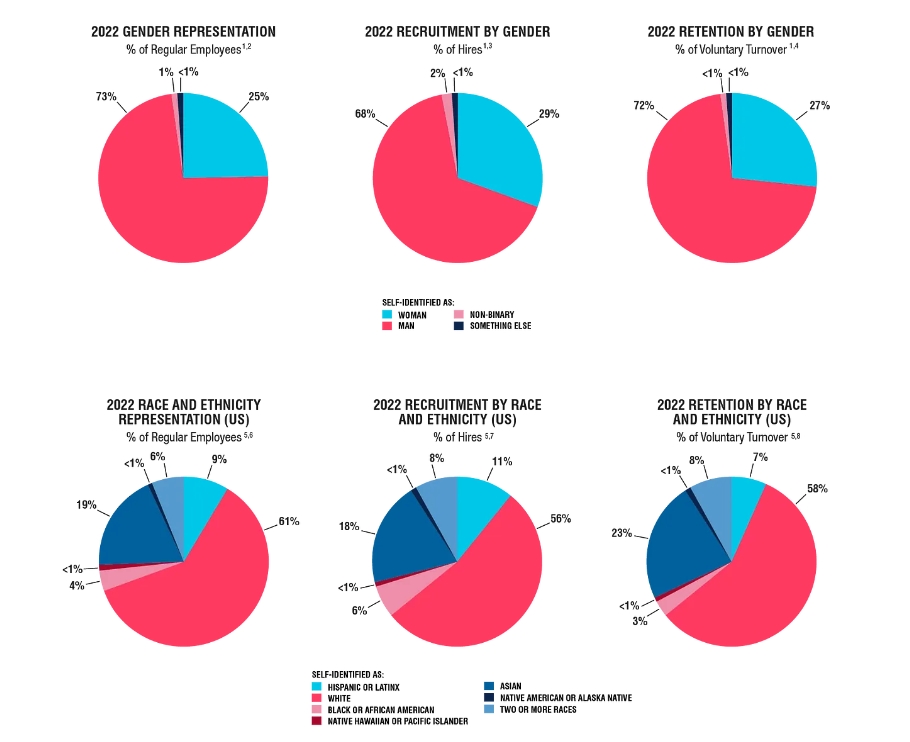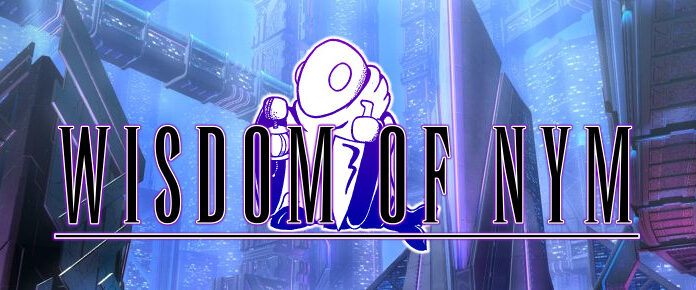
Activision-Blizzard has released a full-year review of its diversity, equity, and inclusion stats for 2022 this week, and the first thing readers will notice is that the data aren’t notably different from the data released a quarter ago, which included all but December from the year 2022. The key addition is further breakdown by race, where previously the company lumped non-white ethnicities together in their own “under-represented ethnic groups” chart. At the time, we noted that Activision-Blizzard had also begun splitting out nonbinary workers and had hired 1100 additional QA testers (in part to counter unionization efforts) that likely helped its numbers, which saw a slight increase in women and minority hires.
In the new report, the company has also begun submitting its retention by gender and race, which will likely make next year’s report more messy, as 2023 is just three months in and is already riddled with reports of ABK’s unionbusting, return-to-office ultimata, and forced-quitting/quiet-layoff waves that typically disproportionately affect women, ethnic minorities, LGBTQ+ folks, and the disabled.
As we’ve noted, the jobs that Blizzard executives have characterized as low-skilled, transient roles – the ones ABK told people to quit if they didn’t want to do them in an office – are again the ones most likely to include the very groups Activision-Blizzard claims it’s trying to recruit and retain to bolster its representation. We also note that ABK does not post representation data for management and executive roles; in 2021, Activision-Blizzard admitted that “numbers vary wildly” between its business units, and of course Blizzard specifically lost its highest-ranking female exec when Jen Oneal blasted the company for tokenizing, harassing, and underpaying her.
ABK Chief Diversity, Equity, and Inclusion Officer Kristen Hines fleshes out the blog with 2500 words devoted to what she asserts is the company’s culture of inclusion, chronicling use of preferred pronouns, roundtables, mentorships, and diverse recruiting. She also talks up diverse representation, anti-toxicity efforts, and accessibility in ABK’s games.
“As we look ahead to the rest of 2023, we’ll continue to evolve our work to positively impact employees’ lived experiences (i.e., how their lives and well-being are impacted by their experience at work),” she writes. “We’ll also continue to embed DE&I practices into every part of Activision, Blizzard, and King. For our people, this means continued focus on education, engagement, mentorship, and leadership development. For our business, we will continue to grow our inclusive game design capabilities and plan initiatives to encourage supplier diversity. In our community, we will grow our presence and build meaningful collaborations to encourage DE&I values across the gaming industry. Our focus for the year ahead is building connections across all that we do. When people feel connected to themselves, their work, the organization, and each other, it brings a sense of purpose and belonging – and that’s our ultimate goal.”
These are noble missions, but they’re also vague, and the company is very publicly not backing them up consistently on the ground. We once again note here that Activision-Blizzard is currently helmed by a man who admitted to threatening to have his female assistant murdered (on a recorded voice mail, no less), and in 2023 we’ve already seen multiple fresh scandals since the discrimination lawsuits that prompted Hines’ hire and all these flowery, feel-good reports.
Just in the last two months, union organizers filed charges against Activision-Blizzard for retaliating against workers who complained about abrupt changes in work-from-home policies; WoW Classic team lead Brian Birmingham was fired for refusing to lie about employee performance and deploy toxic stack ranking against coworkers; and of course, Blizzard’s Mike Ybarra demoralized the studio by slashing worker profit-sharing bonuses, bizarrely insisting executives weren’t making more money than workers, insulting QA workers, and telling workers to quit if they preferred to work from home. In case you thought Ybarra was a single loose cannon, Blizzard representatives backed up Ybarra’s bluster, saying it stood by his words and was “proud of [his] leadership in tough moments.”
It’s difficult to argue that the studios are focusing on “positively impact[ing] employees’ lived experiences” and helping workers “feel connected to themselves, their work, the organization, and each other” under these real-world circumstances. In other words, it’s clear Hines’ high-minded ambitions aren’t actually reflected in the reality of Activision-Blizzard and the rest of its leadership suite at the present, and all the pie charts and roundtables in the world won’t change that.















